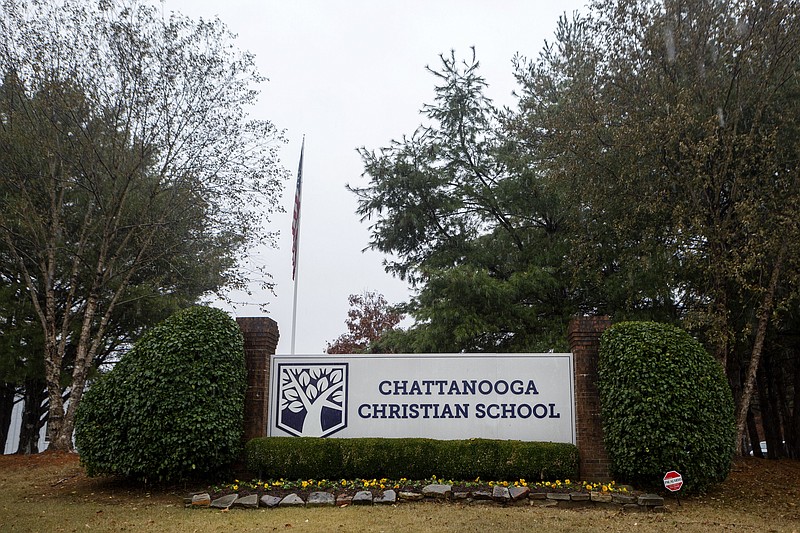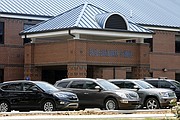Nearly two dozen private schools in Hamilton County are set to receive $1.46 million total in federal coronavirus relief money that some argue was intended to help public school districts across the nation cover short-term needs created by COVID-19 disruptions to schooling.
That compares to about $9.26 million for Hamilton County Schools, the public school district, under the Coronavirus Aid, Relief and Economic Security (CARES) Act. Superintendent Bryan Johnson has earmarked the money for summer programming, student technology and literacy initiatives. About $300,000 of that will go to charter schools.
The private school share of $1.46 million will end up representing about 13.6% of the total $10.7 million local allotment, under guidance from U.S. Secretary of Education Betsy DeVos.
Most of the 22 private schools don't typically receive federal funding because of their status as independent from public school systems, although eight of the schools receive federal Title 1 funds, which are intended to go to schools serving high percentages of students from low-income families.
Chattanooga Christian School, one of the county's larger private schools with more than 1,200 students enrolled last year, will receive the biggest chunk of dollars going to private schools - $248,829.
Boyd Buchanan School will receive nearly $195,000, and Silverdale Baptist Academy is set to receive more than $197,000. Collegedale Academy, which recently consolidated into a K-12 school, is set to receive about $146,274.
Allotments to the eight schools that typically receive Title 1 funds range from $7,800 to $75,300. Those are Annoor Academy, Avondale, Belvoir Christian Academy, Brainerd Baptist School, Notre Dame High School, Our Lady of Perpetual Help Catholic School, Skyuka Hall and St. Jude School.
Jeanette Omarkhail, president of the the local teachers' union, the Hamilton County Education Association, said giving these emergency funds to private schools is wrong.
"I don't have a problem with our private schools, but they are private for a reason. They don't want to be held accountable for the same things that our public schools are held accountable for, so they should not receive this government funding," Omarkhail said. "This was not the intent of Congress. U.S. Sen. Lamar Alexander, R-Tenn., has very clearly said that. This is not coming from legislators, and DeVos hasn't spoken to teachers or public education leaders about their needs."
Alexander told reporters during a virtual news conference last month that the federal funds should be disbursed to help schools the same way as Title 1 funds, rather than rerouting the dollars to private schools.
"My sense was that the money should have been distributed in the same way we distributed Title I money. I think that's what most of Congress was expecting," he said at the time.
Tennessee Education Association (TEA) President Beth Brown also spoke out against DeVos' recommendation last month, highlighting DeVos' support and connections to private schools.
"The coronavirus pandemic should not be used as an excuse to advance bad ideas that siphon funding from public schools. Tennesseans have repeatedly rejected privatization schemes that use taxpayer dollars to fund private school education," Brown said in a statement. "Our state leaders should prioritize providing a quality public education for every child in Tennessee, instead of following the lead of a woman who has repeatedly prioritized corporate profits over students' education."
When DeVos issued the guidance in May, she argued that the CARES Act is a "special, pandemic-related appropriation meant to benefit all American students, teachers and families," according to a letter she wrote on behalf of the U.S. Department of Education.
"There is nothing in the act suggesting Congress intended to discriminate between children based on public or nonpublic school attendance, as you seem to do. The virus affects everyone," she said.
DeVos also noted that she had heard from large numbers of nonpublic schools that they will not be able to reopen this fall. She worries that these school closures are concentrated in low-income and middle-class communities, according to The New York Times.
Chad Dirkse, president of Chattanooga Christian School, acknowledged that some disagree with whether private schools should have access to the funds, but he said the school didn't lobby or request the funds.
"We've been contacted that these funds are available to private schools, so I'm not here to debate it or say anyone is right or wrong in the argument," he said. "But for the benefit of our students and the health and safety and wellness of our students, we are going to explore all options we have available to us."
Dirkse said the school's understanding is that the funds can be used for equipment such as personal protective equipment and cleaning supplies, health services or expanded technology options to support virtual learning.
"It is more expensive to implement some of the health measures that we agree with that are designed to keep our students healthy and safe in the midst of this pandemic," Dirkse said. He said the local school district is the best entity to ensure the federal funds are being used appropriately.
(READ MORE: How a COVID-19 screening app can help students return to Chattanooga Christian School's campus this fall)
Other local groups have also weighed in. The Unity Group of Chattanooga unsuccessfully urged the Tennessee Department of Education to reject the proposed distribution of the funds.
"The Unity Group could not be more more emphatically opposed to this proposal by the Secretary of Education. It is draconian, inequitable, unjust, and just like the Payment Protection Program, which saw very much needed funds go to publicly traded firms and businesses instead of local and minority businesses, this decision favors the rich and affluent [not] the poor," wrote Sherman Matthews Jr. and Eric Atkins on behalf of the group in an email. "Why is it that those who need the most always receive the least? Where is the 'care' in the CARES Act for all our schools, students and teachers who are doing their best to bring a sense of normalcy in under unparalleled circumstances?"
Atkins added that he believes DeVos' guidance is shameful.
"This is a continuation of the war on public education, one that has expanded charter schools, neo-vouchers and education savings accounts, greatly diminished guidance for minority and students with special needs, and failed to address needed measures such as social emotional learning, trauma sensitive schools and restorative practices," Atkins continued in an email.
A spokesperson for the Tennessee Department of Education announced last week that the department intends to follow DeVos' guidance "so as not to jeopardize $260 million of funding for Tennessee students," according to WZTV in Nashville.
Private schools won't directly receive the CARES funding, but will have to work with Hamilton County Schools to determine how and on what the funds can be used. The deadline for schools to opt in to receive funds was last week.
Contact Meghan Mangrum at mmangrum@timesfreepress.com or 423-757-6592. Follow her on Twitter @memangrum.

